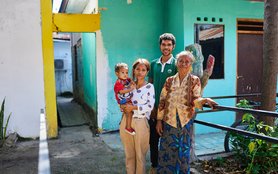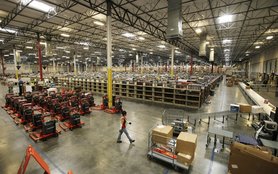Boston, MA – Oxfam America President Raymond C. Offenheiser and Freedom from Hunger President Steve Hollingworth today released significant research findings from a new three-year study exploring the impacts of savings groups in 500 rural villages in Mali. The study is a state-of-the-art, mixed methodology evaluation of the Saving for Change program in the Segou region of Mali, where 82% of households surveyed live on less than $1.25 a day and the typical village is more than 14 miles from a paved road.
“Savings groups respond to the unmet needs of the rural poor by providing a secure place to save,” said Offenheiser. “Today, billions of adults around the world lack access to basic savings and credit, either ignored or forgotten by the commercial banking sector. This research shows that when given the right tools, the rural poor can be savers. The Saving for Change program has thus created a crucial safety net for families living on the edge of subsistence, when one serious illness or drought is the difference between life and death.”
“Financial inclusion, especially when paired with education and other social inputs, can have a transformative impact on the lives of very poor people,” commented Freedom from Hunger President, Steve Hollingworth. “This study confirms that savings groups contribute substantially to the resilience of people living at the edge of hunger. It verifies what we have known for more than 25 years, that access to basic financial services, even non-formal ones, can help very poor families escape chronic hunger.”
Results from the study show that households in villages with savings groups experienced an 8% increase in food security and saved 31% more on average, underscoring the success of Saving for Change, an innovative savings group program of Oxfam America, Freedom from Hunger and the Strømme Foundation.
Saving for Change promotes resilience and the accumulation of productive financial assets for nearly 680,000 members in 13 countries throughout Africa, Asia and Latin America. Working in rural villages, the program trains groups of women to save regularly, borrow from their group’s fund to build small businesses or homes, buy food, educational materials or medicine and to repay loans from the group with interest.
Typically immediate family households in these villages experience a dip in food consumption of about $.38 per adult per week during the “hungry season”, the annual period before the harvest when food is most scarce. The study showed that in participating villages, this dip was essentially eliminated.
Food security, when combined with assets promotes resilience in families and communities. The study showed that the value of livestock held by households in participating villages increased by 13% compared to families in villages without the program. “Livestock are a critical safety net for families. The animals are a form of savings that can be sold in hard times. Imagine if your home value or stock portfolio increased by 13% - it could be game-changing for your family,” said Hollingworth.
The study is unique in that it combines findings from a randomized controlled trial in 500 villages, conducted by Innovations for Poverty Action, with an ethnographic case study conducted in 19 villages by the Bureau of Applied Research in Anthropology at the University of Arizona. By blending these approaches, Oxfam America and Freedom from Hunger were able to identify statistically significant impacts of the program as well as understand the context and complicated village dynamics. The research took place from 2009 to 2012. The size and duration make this the most comprehensive study to explore the impacts of savings groups to date.
The research compares villages with the program to those without the program. In participating villages, 30-40% of women joined Saving for Change groups. Despite this, the results were significant, pointing to additional potential since the reported results include women who did not join, but live in participating villages.
“The impact of this program on savings, loans, livestock and food security is positive outcome we all need to share,” added Offenheiser, who will to deliver this message at next week’s Bretton Woods Committee conference at the International Monetary Fund in Washington.
Additional Evaluation Findings
- Housing quality improved in participating villages. Families living under hard metal roofs, as opposed to wood and mud roofs, increased by 11%.
- The number of women taking loans increased. Women took more loans from their savings groups and fewer loans from family and friends. Taking loans from men outside their families is considered shameful for Malian women so being able to take loans from their all-women savings group is empowering.
- Malaria knowledge, including how to prevent the disease, improved in participating villages.
- Program impacts were shown to be greater in villages where replicators received a 3-day training and low-cost pictorial guide, thus making the case for structured replication training as a cost-effective investment.
Raymond Offenheiser will speak on May 15 on a panel at the 30th anniversary annual meeting of the Bretton Woods Committee, entitled, “Can the IFIs, Business, Government, and Society End Poverty in a Generation?” For more information regarding this event, contact Helen DaSilva, [email protected] or 617-331-2984.
The complete evaluation can be downloaded at www.oxfamamerica.org/SfC or www.freedomfromhunger.org.


